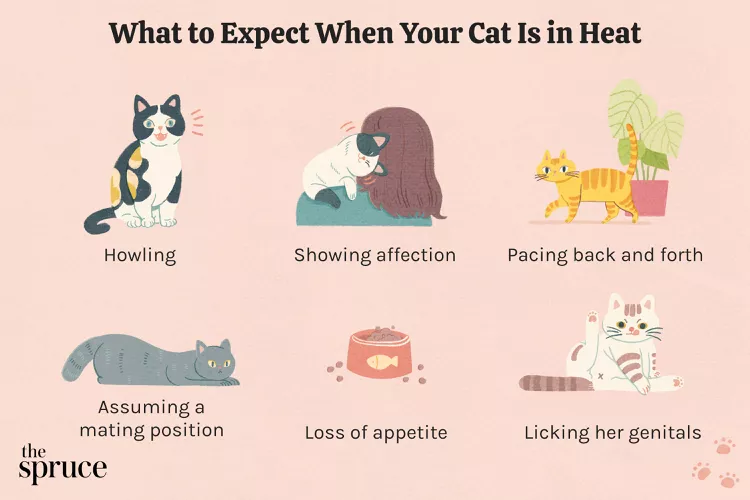What to Expect When Your Cat Is in Heat

Cats in heat don't usually bleed or have periods the way humans do, but they experience several physical and behavioral changes. Heat, or estrus, is the time when unspayed female cats are fertile and receptive to mating. There are several stages to a cat's heat cycle, some of which are similar to the human menstrual cycle, but vaginal bleeding is not a normal occurrence in cats. Here's what to expect when your cat is in heat and what to do if you notice bleeding.
What is a Cat Heat Cycle?
Like most female mammals, cats go through physical cycles that prepare their bodies for reproduction. In humans, this is called the menstrual cycle. In felines, it is called the estrous cycle and it consists of several stages.
When female cats are in the estrus stage, they are said to be "in heat" and are hormonally receptive to both intercourse and reproduction. Unlike humans, cats don't typically experience vaginal bleeding because they don't shed the uterine lining as humans do.
Cats are seasonally polyestrous, which means that heat cycles can occur repeatedly every 14-21 days during a given breeding season. Breeding season is triggered by longer days, meaning there are at least 12-14 hours of sunlight. In the Northern Hemisphere, this means peak estrus is from February to April and can continue through to October.
Heat cycles may start as early as four months of age and will continue until a cat is either bred or spayed. Heat in cats can last on average from six to eight days, and repeat every one to three weeks. It's easy to see, then, how an unspayed female cat almost always seems to be in heat.
Signs of Heat in Cats
A cat in heat will show several specific signs, both physical and behavioral. Bleeding is not commonly seen during heat, but a small amount of mucus-like discharge is possible. Cats are most likely to exhibit the following signs when they're in heat:
- Howling or crying out
- Showing more affection than usual
- Pacing or restlessness
- Licking genital area
- Decrease appetite
- Trying to escape (to find a mate)
- Spraying urine
- Assuming a mating position, called lordosis
With signs like this, it may seem like your cat is in pain or distress. However, the purpose of these behaviors is to attract the attention of an unneutered male cat so she can become pregnant. If your cat mates and doesn't get pregnant, a false pregnancy may ensue. She may briefly show signs of pregnancy before going back into estrus about six weeks later. If your cat does not mate with a male during estrus, she will enter an infertile period called interestrus for around two to 19 days, after which the cycle starts again.
What To Do If Your Cat Is Bleeding During Heat
Cats do not shed the lining of their uterus, so vaginal bleeding should not occur. Some cats will have a light discharge that looks like mucus. Bleeding is not a normal part of a heat cycle and is a sign of a health problem, such as a uterine infection called a pyometra or possibly a urinary tract infection. Seeing spots of blood around the hind end may even indicate a problem with non-reproductive body parts such as her anal glands. Contact your veterinarian if your female cat is bleeding from her genital area or if you notice spotting on bedding or floors.
How to Care for a Cat in Heat
A cat in heat can be difficult to live with, especially when she's extremely vocal or needy. Know that her behaviors are normal and can't be controlled through training. Spaying your cat is the only way to stop these signs permanently.
If you're considering breeding your cat in the future or do not wish to spay your cat, ask your veterinarian about medications to stop estrus and prevent pregnancy. Unfortunately, many of these preventative medications carry risks of side effects and few are approved for use in the U.S.
To help your cat through her heat cycles, provide plenty of enrichment to keep her happy and comfortable:
- Offer toys or pillows that your cat can safely play with and cannot accidentally swallow.
- Play with your cat often.
- Get a cat cave or make a kitty nest to provide privacy.
- If needed, ask your vet about feline calming aids that will help your cat relax.
Most importantly, be sure to keep your cat indoors while she is in heat to prevent unwanted pregnancy as well as to avoid accidents such as getting hit by a car or becoming lost. No matter how much she begs, do not allow her to go outside unless you have a secure enclosure or catio, and supervise her while she's in it.
Contact your veterinarian for advice if your cat is showing signs of illness or behaving in ways that seem abnormal to you.